| Srl | Item |
| 1 |
ID:
086855
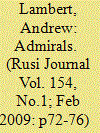

|
|
|
|
|
| Publication |
2009.
|
| Summary/Abstract |
Historically, the job of the admiral was to make high level decisions that affected the conduct of war, or the preservation of peace, far from home, and without access to the advice of kings or queens, statesmen and ministers. This article charts the necessary qualities and gifts of successful British admirals throughout the ages.
|
|
|
|
|
|
|
|
|
|
|
|
|
|
|
|
| 2 |
ID:
086852
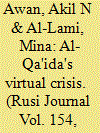

|
|
|
|
|
| Publication |
2009.
|
| Summary/Abstract |
The fight Al-Qa'ida has waged against the West has been fought on a virtual as well as physical battlefield. Recently, many jihadist strongholds and hiding places on the web have been shut down. This article charts the growth and the current crisis of Al-Qa'ida's 'media jihad'.1
|
|
|
|
|
|
|
|
|
|
|
|
|
|
|
|
| 3 |
ID:
086842


|
|
|
|
|
| Publication |
2009.
|
| Summary/Abstract |
Alastair Crooke argues that the West has got it wrong. The template of 'supporting moderates' whilst weakening extremists is both simplistic and flawed. The recent Israel-Hamas conflict is just the latest expression of the use of a template doomed to fail.
|
|
|
|
|
|
|
|
|
|
|
|
|
|
|
|
| 4 |
ID:
086841
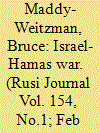

|
|
|
|
|
| Publication |
2009.
|
| Summary/Abstract |
Both Israel and Hamas claimed victory in the aftermath of the three-week war. Israel sought to re-establish its regional deterrence and undermine Hamas; and Hamas hoped to improve the terms of the uneasy calm with Israel. But the war may have created some new opportunities for progress through diplomacy, even though the conflict appears more intractable than ever.
|
|
|
|
|
|
|
|
|
|
|
|
|
|
|
|
| 5 |
ID:
086837


|
|
|
|
|
| Publication |
2009.
|
| Summary/Abstract |
Recent counter-insurgency doctrine has largely ignored the justice sector. This article, referring to current multinational efforts in Afghanistan, contends that this is a serious mistake. It is an error not made by the Taliban, who are acutely aware of its importance.
|
|
|
|
|
|
|
|
|
|
|
|
|
|
|
|
| 6 |
ID:
086854


|
|
|
|
|
| Publication |
2009.
|
| Summary/Abstract |
An escalating security crisis in Mexico threatens to spill over into the southern United States. In formulating its response, the US must face the reality that it is part of the problem as well as the solution.
|
|
|
|
|
|
|
|
|
|
|
|
|
|
|
|
| 7 |
ID:
086840
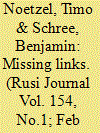

|
|
|
|
|
| Publication |
2009.
|
| Summary/Abstract |
The need for COIN operations to tackle the Taliban insurgency in Afghanistan is accepted by most coalition members. The German army has yet to adapt to this development. This article examines why the German political establishment still contests the need for counter-insurgency tactics in northern Afghanistan.
|
|
|
|
|
|
|
|
|
|
|
|
|
|
|
|
| 8 |
ID:
086850


|
|
|
|
|
| Publication |
2009.
|
| Summary/Abstract |
The 'resurgence' of a newly confident Russia has alarmed observers, some of whom talk of a 'new cold war'. The political and military role of the Russian Navy bears examination in the context of Russia's aims internationally. A resurgent Russia - and Russian fleet - poses tough strategic questions for the UK, particularly when the present and future capability of the Royal Navy is increasingly questioned.
|
|
|
|
|
|
|
|
|
|
|
|
|
|
|
|
| 9 |
ID:
086860


|
|
|
| 10 |
ID:
086857


|
|
|
|
|
| Publication |
2009.
|
| Summary/Abstract |
The siege of Tobruk in 1941, until its relief by the 8th Army in December 1941, involved an extensive British supply effort by sea. Despite the Axis powers' best efforts, the supplies were not halted. While the British service arms worked in close co-operation, German and Italian efforts were characterised by unco-ordinated inter-service and inter-command action.
|
|
|
|
|
|
|
|
|
|
|
|
|
|
|
|
| 11 |
ID:
086844
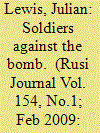

|
|
|
|
|
| Publication |
2009.
|
| Summary/Abstract |
The current economic crisis and two costly wars have put much strain on British defence planners. Government expenditure is being placed under increasing scrutiny. There have been voices claiming that Trident is an unnecessary expense. This article counters this argument and advocates the necessity of maintaining and renewing Britain's nuclear deterrent.
|
|
|
|
|
|
|
|
|
|
|
|
|
|
|
|
| 12 |
ID:
086839


|
|
|
|
|
| Publication |
2009.
|
| Summary/Abstract |
The Tactical Conflict Assessment Framework was used by British forces in Helmand Province to attempt to quantitatively understand how best to combat the insurgency in Afghanistan - but it was soon discontinued. David Wilson and Gareth Conway examine why this method fell out of favour, the specific lessons learnt, and what methodologies may be more appropriate.
|
|
|
|
|
|
|
|
|
|
|
|
|
|
|
|
| 13 |
ID:
086843
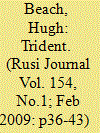

|
|
|
|
|
| Publication |
2009.
|
| Summary/Abstract |
Britain has possessed its own nuclear weapons for just over fifty years and is laying plans to keep them going for the next half-century. Hugh Beach argues that there are better things to spend government money on and the Trident replacement programme should be cancelled.
|
|
|
|
|
|
|
|
|
|
|
|
|
|
|
|
| 14 |
ID:
086859


|
|
|
|
|
| Publication |
2009.
|
| Summary/Abstract |
The inter-war years were pivotal in determining the course of the Second World War. What role did RUSI play during this period? Its output reflected a worthy but mixed effort. But the Institute could do little to influence the larger political currents in Britain and abroad as the world once again headed for catastrophe.
|
|
|
|
|
|
|
|
|
|
|
|
|
|
|
|